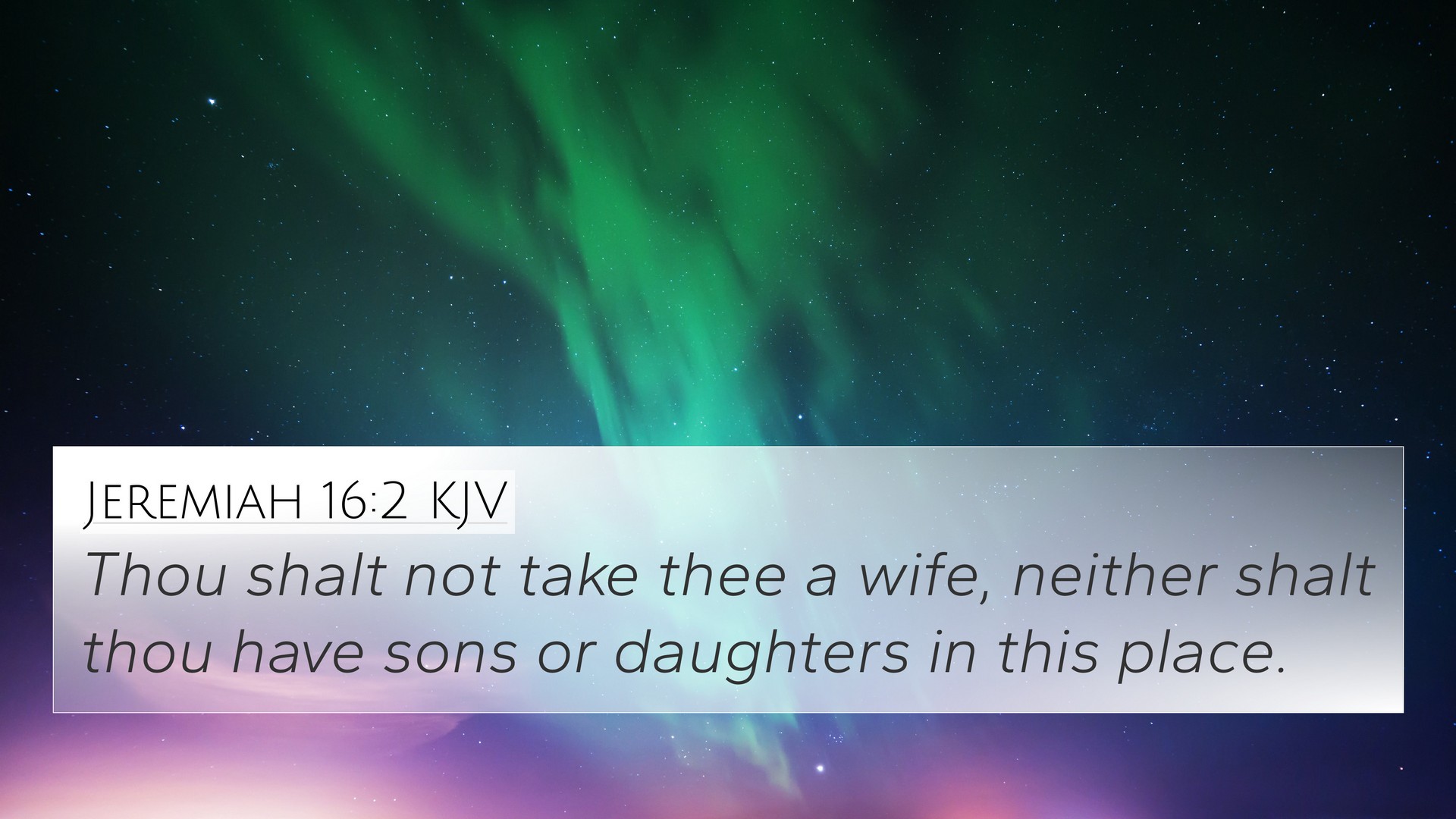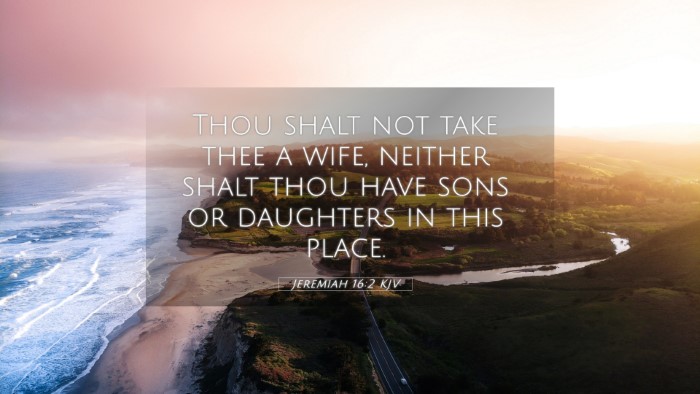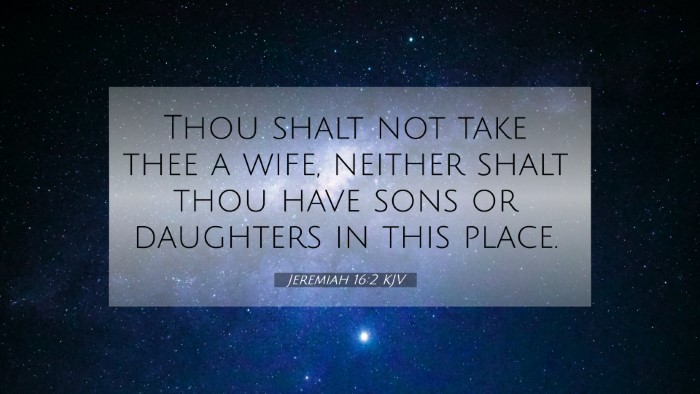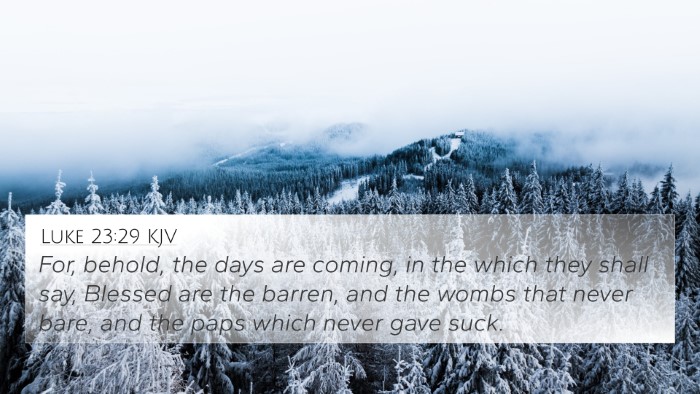Understanding Jeremiah 16:2
Jeremiah 16:2 states: "You shall not take a wife, nor shall you have sons or daughters in this place." This verse, spoken to the prophet Jeremiah, has profound implications regarding God's message and the unique role of the prophet during a tumultuous time in Israel's history.
Contextual Overview
This verse is situated in a larger narrative where God instructs Jeremiah to abstain from familial connections, illustrating the severity of the social and spiritual crisis facing Judah. It symbolizes his prophetic role and the urgent message he must deliver to the people.
Commentary Insights
-
Matthew Henry's Commentary:
Henry reflects upon the severe situation of Judah, highlighting that Jeremiah's celibacy symbolizes the coming calamities. By not marrying or having children, he embodies the desolation that the land would face due to their disobedience. His personal sacrifice serves as a prophetic sign, emphasizing the weight of God’s impending judgment.
-
Albert Barnes' Commentary:
Barnes points out the rationale behind God's command. He emphasizes that the social environment of Israel at that time was corrupt and filled with impending doom, making it inappropriate for Jeremiah to seek personal comforts. This command reinforces the idea that the prophet's life is a living representation of God’s message to His people.
-
Adam Clarke's Commentary:
Clarke discusses the implications of this command related to the broader context of prophetic duties. He suggests that Jeremiah's actions reflect God’s desire for complete devotion from His prophets, where personal life must take a backseat to divine calling. Clarke stresses the importance of understanding prophetic symbolism in the context of Israel’s history.
Thematic Connections and Cross-References
Jeremiah 16:2 establishes a compelling theme regarding the sacrifices of prophets. Here are some notable cross-references that reinforce the themes of suffering, divine judgment, and prophetic calling:
- Hosea 1:2-3: The command to marry a prostitute symbolizes Israel's unfaithfulness to God.
- Ezekiel 3:26-27: God restricts Ezekiel’s speech, emphasizing the burdens of prophecy.
- Lamentations 1:1: Reflects on the desolation of Jerusalem, reinforcing the somber state of the people.
- Matthew 19:12: Jesus speaks of celibacy for the kingdom of heaven, linking personal sacrifice to divine service.
- 1 Corinthians 7:32-35: Paul discusses remaining single for the Lord’s work, paralleling Jeremiah’s sacrifice.
- Luke 14:26: Jesus teaches the requirement of prioritizing God’s call over family ties.
- Acts 20:24: Paul mentions his life’s aim to finish the ministry, echoing the commitment required of prophets.
- 2 Timothy 2:4: Paul encourages soldiers of Christ to avoid civilian distractions, similar to Jeremiah's singular focus.
- Micah 7:1: Micah laments the state of his community, paralleling Jeremiah’s prophetic grief.
- John 15:18-19: Jesus prepares His followers for opposition, akin to the challenges faced by Jeremiah.
Conclusion
Jeremiah 16:2 serves as a critical reminder of the weighty responsibilities borne by God’s prophets. The command to abstain from marriage and family reflects the deep sorrow resulting from the people’s rebellion and stands as a prophetic symbol of the judgment to come. By understanding this verse and its connections to other Biblical texts, we can gain deeper spiritual insights into the nature of divine calling and the sacrifices required in the life of faith.
Utilizing Cross-References in Bible Study
For those interested in deeper study, cross-referencing Biblical texts allows believers to grasp the interconnectedness of scripture, giving context and depth to individual verses. Utilizing tools for Bible cross-referencing enhances understanding of how themes evolve throughout the scriptures, such as the sacrifices made by prophets and the call to faithfulness amidst adversity.
Suggested Tools for Effective Bible Study:
- Bible Concordance: A comprehensive tool for finding where words are used across various texts.
- Bible Cross-Reference Guide: Lists connections between verses, assisting in thematic studies.
- Bible Cross-reference System: Helps to locate related verses across Old and New Testament.
- Bible Chain References: Traces themes through consecutive verses.
- Cross-reference Bible Study Methods: Strategies for linking verses effectively.
By actively engaging in cross-referencing Bible studies, one can uncover insights that reinforce faith and understanding, making the scriptures come alive in personal application.







